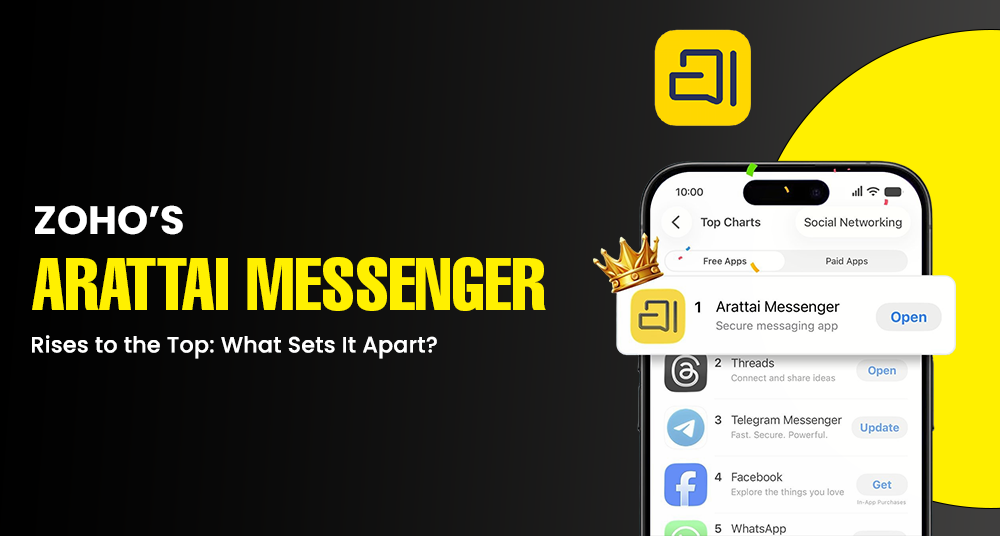In September 2025, Zoho’s messaging app Arattai surged to the top of the Apple App Store’s Social Networking charts in India, turning heads across the tech and messaging ecosystem. started as a relatively low-profile product has become a topic of national interest, especially with government endorsements and growing discourse around data sovereignty and digital self-reliance.
In this blog, we’ll dive deep into Arattai’s features, its journey to the top, how it positions itself as an alternative to WhatsApp, and whether it has the potential to truly disrupt the messaging giant. Expect a detailed breakdown, comparisons, challenges, and what lies ahead for this “Made in India” messaging contender.
Background & Rise to No. 1
Arattai Messenger, developed by Zoho Corporation, is an Indian cross-platform instant messaging and VoIP app. The name “Arattai” is derived from Tamil, meaning “casual chat” or “conversation.” Launched in 2021 amid privacy concerns around WhatsApp’s policy changes, the app remained relatively under the radar for years.
That changed in late 2025, when Arattai began climbing the charts—bolstered by public endorsements by ministers and government figures promoting indigenous tech. The timing aligns with rising interest in digital sovereignty in India, giving Arattai momentum beyond just its features.
Topping the charts is a significant signal: users are actively trying new apps, seeking alternatives, and responding to calls for homegrown solutions. But to retain that interest, Arattai must deliver consistently on reliability, privacy, performance, and features.
Full Detail: Features of Arattai Messenger
Here’s a comprehensive look at what Arattai offers (as per latest available public sources) and how these stack up against competitive expectations:
Messaging & Chat (One-to-One + Groups)
Users can send text messages, voice notes, and create group chats. Arattai supports large group sizes—reports indicate up to 1,000 participants.
Voice & Video Calls
Arattai supports audio and video calling, with end-to-end encryption on calls. Group video calling is supported (reports mention up to 6 participants).
Media & File Sharing
Users can share images, videos, documents, and more.
Stories / Status-like Features & Broadcasts / Channels
Arattai has features that resemble “stories” (temporary posts) and Channels (broadcast-style, one-to-many content) for creators or organizations.
Multi-Device Support
Arattai supports using the app across multiple devices (smartphone, desktop, possibly Android TV). Messages, contacts, and settings sync across devices.
Privacy & Encryption
Calls are end-to-end encrypted. For messages, full end-to-end encryption is not uniformly guaranteed yet; it’s a feature in progress.
Low-End Device & Low-Bandwidth Optimization
Zoho has emphasized that Arattai is built to run smoothly on low-end devices and even in regions with weak connectivity.
UI / Simplicity & Design
Arattai’s interface is marketed as simple, intuitive, and user-friendly—familiar to messaging users so switching is easier.
Secret Chats / Disappearing Messages
Arattai has added features such as Disappearing Messages (messages vanish after defined time) for 1:1 and group chats. Also a “Screen Security” feature prevents content from showing in the Android recent apps switcher.
Hidden Phone Numbers / Privacy in Groups
Unlike WhatsApp, there are reports that Arattai hides participants’ phone numbers in group chats.
Integrations & Workflow Automation
Arattai integrates with Zoho products: for example, integration with Zoho Cliq and being triggerable via Zoho Flow for workflows. This gives it an edge for business or hybrid use.
Document Scanner, Secret Chats, and More in Pipeline
Zoho’s plans for Arattai include features like document scanning, secret chats, scheduled messages, local language support, and tighter encryption.
How Arattai Positions as an Alternative to WhatsApp?
Arattai is not marketed as “just another messaging app”—its proposition is deeper: a homegrown, privacy-first, efficient alternative in the Indian (and emerging markets) context.
Key differentiators & comparisons
Data Localization & Digital Sovereignty
Arattai emphasizes that user data is stored in India and not shared with foreign entities. This resonates with growing demand for national digital products.
Optimized for Low-End Devices / Low Connectivity
WhatsApp is feature-rich but can be heavy for older or budget devices. Arattai’s lean architecture intends to appeal to users with weaker phones or slow networks.
Larger Group Sizes & Hidden Numbers
Arattai supports big groups (up to 1,000 users) and hides phone numbers in group contexts—features that WhatsApp doesn’t always offer or makes less flexible.
Integrated Workflow / Business Utility
Because of integrations with Zoho’s suite, Arattai can more naturally integrate into business workflows, bridging personal & professional messaging. WhatsApp has Business API, but Arattai’s native tie-ins may give it an advantage in certain niches.
Feature Parity in Calls, Media, Channels
Arattai already offers most of what WhatsApp users expect—calls, media sharing, stories, channels—so the learning curve is low.
However, there are gaps: WhatsApp currently enjoys stronger global reach, more mature encryption (message-level E2E for all chats), countless users and network effects. Arattai is still evolving to fill that gap.
Challenges & Risks for Arattai
Even with strong design, Arattai faces significant hurdles:
Encryption & Security Trust
While Arattai encrypts calls, full message-level end-to-end encryption is not yet standard everywhere. Users who prioritize privacy may hold back until this is fully matured.
User Base & Network Effects
WhatsApp’s massive user base is a big moat. For Arattai to succeed, people must find meaningful contacts already using it, or switch en masse.
Scalability & Infrastructure
Rapid growth stresses servers. To maintain smooth experience, Arattai must scale backend reliably, especially when loads spike.
Feature Parity & Stability
Users expect parity in features, stability, cross-platform sync, backup, etc. If these lag, users will abandon.
Trust & Perception
Some may view it as a “government-endorsed” app, which can evoke skepticism in privacy-sensitive circles. Also, being new, it must build credibility.
Regulatory & Legal Compliance
Operating in India requires compliance with data, privacy, and telecom laws. Being local may help, but scrutiny will likely be high.
What Makes Arattai’s Rise Notable
- Charts Breakthrough: Topping App Store rankings in social networking category is a symbolic and strategic win.
- Government Endorsement: Support from ministers boosts visibility and trust in user base.
- Homegrown Branding: In times when digital sovereignty is emphasized, domestic apps carry patriotic appeal.
- Built with Enterprise Expertise: Zoho’s background in communication, collaboration, and SaaS operations positions it to manage large-scale systems.
What’s Next & Roadmap (Speculative & Based on Public Signals)
- Full implementation of end-to-end encryption for messages across all chats, not just calls.
- Expanding secret / self-destructing chat features beyond current scope.
- Rollout of local languages, regional UI, accessibility improvements.
- More business tools / integrations leveraging Zoho’s ecosystem (CRM, workflows, bots).
- Better import / migration tools (moving from WhatsApp, etc.).
- Offline / limited-connectivity optimizations.
- Global expansion beyond India or into regional markets.
Conclusion
Zoho’s Arattai Messenger’s leap to the top charts is not just a fluke—it’s the result of a confluence of market sentiment, government support, and an offering tailored for Indian users. Its feature set is solid and growing, with core messaging, calls, media sharing, and services like channels, multi-device support, and workflow integrations.
Yet, becoming a true alternative to WhatsApp is a steep climb. The odds are stacked in WhatsApp’s favor because of network effects, reach, encryption maturity, and user stickiness. Arattai’s path forward will depend on execution, trust, and steady feature rollout.
For users curious about switching, Arattai presents a compelling option—especially for those who want a domestic app, more control over data localization, and integrated workflow potential. The app’s success will likely be a bellwether for whether India can nurture a globally competitive messaging alternative.
Frequently Asked Questions (FAQs)
1. Who owns Arattai Messenger?
Arattai is developed by Zoho Corporation, the Indian software company based in Chennai.
2. When was Arattai launched?
Arattai was launched in 2021 as Zoho’s messaging offering.
3. Is Arattai free to use?
Yes, Arattai is currently free, with no mandatory subscription model.
4. Does Arattai support end-to-end encryption for messages?
As of now, Arattai offers end-to-end encryption for calls, but full message-level encryption is still being expanded.
5. Can I use Arattai across multiple devices?
Yes, Arattai supports multi-device synchronization (phone, desktop, possibly other devices) with shared chat history and settings.
6. What is a unique group-chat advantage of Arattai vs WhatsApp?
Arattai supports large groups (up to ~1,000 users) and hides participants’ phone numbers in groups—features that enhance privacy and scale.
7. Is Arattai optimized for low-end phones / low bandwidth?
Yes, Arattai is intentionally built to run well even on modest devices and weak network conditions, which many messaging apps struggle with.
8. Can Arattai integrate with business tools / workflows?
Yes. Arattai integrates with Zoho Cliq and can be used in Zoho Flow for automated workflows, making it useful in organizational contexts.
Related Blog: Build a Messaging App Like Arattai Messenger






What do you think?
It is nice to know your opinion. Leave a comment.